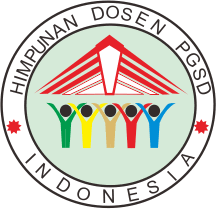Implementasi manajemen kelas sosio-emosional pada peserta didik kelas IV-V community learning center (CLC) prolific malaysia
Abstract
This study aims to describe the implementation of social-emotional classroom management of fourth and fifth-grade students at the Community Learning Center (CLC) Prolific, located in Sandakan, Malaysia. Employing a descriptive qualitative approach, data were obtained through classroom observations, teacher interviews, and document analysis, and analyzed using the Miles and Huberman interactive model with triangulation techniques to ensure data validity. The findings indicate that the implementation centers on four main aspects: emotional awareness, social relationships, self-resilience and decision making or life experiences, and communication development. Teachers integrated reflective dialogue, collaborative activities, personal storytelling, nonverbal communication training, and participatory conflict resolution as core strategies. These approaches fostered a classroom environment that supports open expression, empathy, and mutual respect, while also strengthening students’ confidence, listening skills, and ability to communicate assertively and critically. The teacher’s role as a model of positive communication was pivotal in shaping a supportive and inclusive classroom culture. The study concludes that socio-emotional classroom management, when implemented consistently, contributes significantly to the development of interpersonal communication skills and can be recommended as a best practice for multicultural and nonformal educational settings. The findings of this study are expected to provide theoretical contributions in the development of socio-emotional-based classroom management as well as practical applications for teachers and educational institutions in creating a learning climate that supports students' social and emotional well-being.
Keywords
References
[1] M. T. Greenberg, “Evidence for Social and Emotional Learning in Schools,” Learn. Policy Inst., no. March, pp. 1–48, 2023.
[2] Schonert-Reichl and K. A., “Social and Emotional Learning and Teachers. The Future of Children,” Prz. Geol., vol. 65, no. 10, pp. 672–677, 2017.
[3] H. A. Harahap et al., “PENGUATAN AKSES PENDIDIKAN ANAK MIGRAN MELALUI COMMUNITY LEARNING CENTER ( CLC ) DI JOHOR ,” vol. 2, no. 2, pp. 155–158, 2024.
[4] L. Anggraini, K. Lubis, and A. R. Matondang, “Pengaruh Pengelolaan Kelas Melalui Pendekatan Sosio-Emosional terhadap Prestasi Belajar Siswa pada Mata Pelajaran Aqidah Akhlaq di MTs SKB 3 Menteri …,” J. Pendidik. Tambusai, vol. 8, pp. 14278–14291, 2024, [Online]. Available: https://jptam.org/index.php/jptam/article/view/14409
[5] V. Araya, K. Limiansih, and G. A. C. Budiono, “Manajemen Emosi Guru Dalam Pengelolaan Kelas: Studi Kualitatif Tentang Strateg Mengatasi Perilaku Agresif Peserta Didik.,” Pendas J. Ilm. Pendidik. Dasar, vol. 10, no. 02, pp. 221–233, 2025.
[6] N. Khoiri, S. Patimah, A. Firdianti, and Y. Rahelli, “Kajian Teoritis: Pendekatan Sosio Emosional Dalam Pengelolaan Kelas Di Sekolah Dasar,” COLLASE (Creative Learn. Students Elem. Educ., vol. 08, no. 02, pp. 330–341, 2025, [Online]. Available: http://journal.ikipsiliwangi.ac.id/index.php/collase/article/view/26751
[7] W. R. Septiand, N. Hariyati, M. Mustaji, A. Khamidi, K. Amalia, and M. Nursalim, “Implementasi MGMP sebagai Strategi Penguatan Kompetensi Guru di Community Learning Center (CLC),” JIIP - J. Ilm. Ilmu Pendidik., vol. 8, no. 6, pp. 6681–6689, 2025, doi: 10.54371/jiip.v8i6.8271.
[8] A. Zainul, Y. Masrifatin, and A. Prastowo, “Merdeka Belajar: Kesiapan Guru dalam Pembelajarandi Madrasah Ibtidaiyah,” Mentari, vol. 1, no. 2, pp. 111–119, 2023.
[9] Y. Pemba, D. Darmawang, and N. R. Kusuma, “Peran Lingkungan Belajar Terhadap Konsentrasi Belajar Peserta Didik Di Smk Katolik Muktyaca,” J. Pendidik. dan Profesi Kegur., vol. 2, no. 1, p. 12, 2022, doi: 10.59562/progresif.v2i1.29859.
[10] H. G. Ginott, “Teacher and Child A Book for Parents and Teachers,” 1975, [Online]. Available: http://www.archive.org/details/teacherchildbookginOOgino
[11] P. A. Jennings, S. Doyle, Y. Oh, D. Rasheed, J. L. Frank, and J. L. Brown, “Long-term impacts of the CARE program on teachers’ self-reported social and emotional competence and well-being,” J. Sch. Psychol., vol. 76, no. April, pp. 186–202, 2019, doi: 10.1016/j.jsp.2019.07.009.
[12] S. M. Jones and J. Kahn, “Supporting Students’ Social, Emotional, and Academic Development,” Aspen Inst., p. 20, 2017, [Online]. Available: https://assets.aspeninstitute.org/content/uploads/2017/09/SEAD-Research-Brief-9.12_updated-web.pdf%0Ahttps://files.eric.ed.gov/fulltext/ED577039.pdf
[13] L. D. Hammond, M. E. Hyler, and M. Gardner, “Effective Teacher Professional Development in the evolution of human and non-human animals,” Learn. Policy Inst., no. June, 2017.
[14] G. Gay, “Culturally responsive teaching: Theory, research, and practice,” Teachers College Press. 2018.
[15] K. M. Zinsser, C. G. Christensen, and L. Torres, “She’s supporting them; who’s supporting her? Preschool center-level social-emotional supports and teacher well-being,” J. Sch. Psychol., vol. 59, pp. 55–66, 2016, doi: 10.1016/j.jsp.2016.09.001.
[16] K. A. Schonert-Reichl, “Advancements in the Landscape of Social and Emotional Learning and Emerging Topics on the Horizon,” Educ. Psychol., vol. 54, no. 3, pp. 222–232, 2019, doi: 10.1080/00461520.2019.1633925.
[17] A. Fatimah, N., Suryadi, D., & Haryono, “Evaluasi efektivitas kurikulum merdeka dalam meningkatkan karakter dan kompetensi siswa di sekolah dasar,” J. Didakt. Dwija Indria, vol. 13, pp. 323–331, 2025.
[18] C. Cipriano et al., “The state of evidence for social and emotional learning: A contemporary meta-analysis of universal school-based SEL interventions,” Child Dev., vol. 94, no. 5, pp. 1181–1204, 2023, doi: 10.1111/cdev.13968.
[19] T. F. Azzahro, S. Marmoah, and T. Budiharto, “Pengaruh iklim sekolah dan pola komunikasi terhadap profil pelajar pancasila di sekolah dasar,” Didakt. Dwija Indria, vol. 13, no. 2, pp. 211–216, 2024, [Online]. Available: https://jurnal.uns.ac.id/JDDI/article/view/91522%0Ahttps://jurnal.uns.ac.id/JDDI/article/download/91522/50034
[20] F. A. Ikhtiana, “Analisis kemampuan berpikir kritis menggunakan teori konstruktivisme pada model pembelajaran ipa peserta didik kelas V sekolah dasar,” Didakt. Dwija Indria, vol. 10, no. 5, pp. 70–74, 2023, doi: 10.20961/ddi.v8i01.39775.
Refbacks
- There are currently no refbacks.



